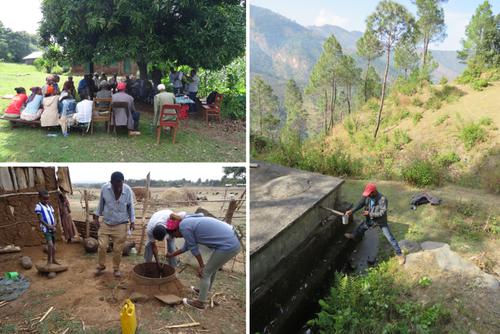当前位置:
X-MOL 学术
›
WIREs Water
›
论文详情
Our official English website, www.x-mol.net, welcomes your
feedback! (Note: you will need to create a separate account there.)
The benefits and negative impacts of citizen science applications to water as experienced by participants and communities
WIREs Water ( IF 6.8 ) Pub Date : 2020-10-12 , DOI: 10.1002/wat2.1488 David W. Walker 1 , Magdalena Smigaj 2 , Masakazu Tani 3
WIREs Water ( IF 6.8 ) Pub Date : 2020-10-12 , DOI: 10.1002/wat2.1488 David W. Walker 1 , Magdalena Smigaj 2 , Masakazu Tani 3
Affiliation

|
Citizen science is proliferating in the water sciences with increasing public involvement in monitoring water resources, climate variables, water quality, and in mapping and modeling exercises. In addition to the well‐reported scientific benefits of such projects, in particular solving data scarcity issues, it is common to extol the benefits for participants, for example, increased knowledge and empowerment. We reviewed 549 publications concerning citizen science applications in the water sciences to examine personal benefits and motivations, and wider community benefits. The potential benefits of involvement were often simply listed without explanation or investigation. Studies that investigated whether or not participants and communities actually benefitted from involvement, or experienced negative impacts, were uncommon, especially in the Global South. Assuming certain benefits will be experienced can be fallacious as in some cases the intended benefits were either not achieved or in fact had negative impacts. Identified benefits are described and we reveal that more consideration should be given to how these benefits interrelate and how they build community capitals to foster their realization in citizen science water projects. Additionally, we describe identified negative impacts showing they were seldom considered though they may not be uncommon and should be borne in mind when implementing citizen science. Given the time and effort commitment made by citizen scientists for the benefit of research, there is a need for further study of participants and communities involved in citizen science applications to water, particularly in low‐income regions, to ensure both researchers and communities are benefitting.
中文翻译:

参与者和社区所体验到的公民科学对水的应用的益处和负面影响
随着公众越来越多地参与监测水资源,气候变量,水质以及制图和建模练习,公民科学在水科学中正在激增。除了此类项目报告的科学收益,特别是解决数据稀缺性问题外,通常还夸大了参与者的收益,例如,知识的增强和能力的增强。我们审查了549篇有关水科学中公民科学应用的出版物,以检验个人利益和动机以及更广泛的社区利益。参与的潜在好处通常被简单列出,而没有任何解释或调查。调查参与者和社区是否真正从参与中受益或遭受负面影响的研究很少见,特别是在全球南方。假设将要获得某些收益可能是错误的,因为在某些情况下,预期收益未实现或实际上产生了负面影响。描述了已确定的利益,并且我们揭示应该更多地考虑这些利益之间的相互关系以及它们如何建立社区资本以促进其在公民科学水项目中的实现。此外,我们描述了已发现的负面影响,尽管尽管可能并不罕见,但很少考虑到这些负面影响,在实施公民科学时应牢记这些负面影响。鉴于公民科学家为研究的利益付出了时间和精力,因此有必要进一步研究参与公民科学应用于水的参与者和社区,特别是在低收入地区,
更新日期:2020-12-20
中文翻译:

参与者和社区所体验到的公民科学对水的应用的益处和负面影响
随着公众越来越多地参与监测水资源,气候变量,水质以及制图和建模练习,公民科学在水科学中正在激增。除了此类项目报告的科学收益,特别是解决数据稀缺性问题外,通常还夸大了参与者的收益,例如,知识的增强和能力的增强。我们审查了549篇有关水科学中公民科学应用的出版物,以检验个人利益和动机以及更广泛的社区利益。参与的潜在好处通常被简单列出,而没有任何解释或调查。调查参与者和社区是否真正从参与中受益或遭受负面影响的研究很少见,特别是在全球南方。假设将要获得某些收益可能是错误的,因为在某些情况下,预期收益未实现或实际上产生了负面影响。描述了已确定的利益,并且我们揭示应该更多地考虑这些利益之间的相互关系以及它们如何建立社区资本以促进其在公民科学水项目中的实现。此外,我们描述了已发现的负面影响,尽管尽管可能并不罕见,但很少考虑到这些负面影响,在实施公民科学时应牢记这些负面影响。鉴于公民科学家为研究的利益付出了时间和精力,因此有必要进一步研究参与公民科学应用于水的参与者和社区,特别是在低收入地区,











































 京公网安备 11010802027423号
京公网安备 11010802027423号